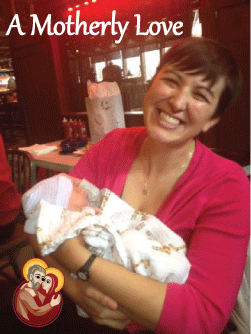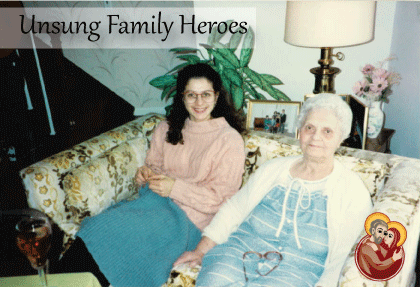Made for Love Ep 30: The Dating Podcast: Stories
This episode is full of stories from Catholics dating. Some are dating fails, some are successes.
Available on Podbean:
And Soundcloud:
Check out more from Jacqueline vonSchleppenbach in this article from Verily!
Archive
A Motherly Love: Single People and the Family
 Lori was my first friend to have a baby. I looked at this little person in her arms and thought about how blessed Therese was to have Lori and Tim as her parents. She had such a thoughtful expression, this baby girl. I was never one for babysitting, but I could come through in a pinch and struggle my way through reading baby signs that I was never taught (and no, this knowledge doesn’t come automatically with XX chromosomes!). Slowly, as more and more of my friends married and had children, rather than feeling myself more distant from them in my single state, I felt carried along, almost as if I was likewise becoming a mother, albeit not in the same way. I know allllllll sorts of things about pregnancy, childbirth, and raising children now, even though I haven’t gone through any of it myself. I feel towards my friends’ children a fierce protectiveness and a tender affection. I know their temperaments and have seen them on good days and bad days.
Lori was my first friend to have a baby. I looked at this little person in her arms and thought about how blessed Therese was to have Lori and Tim as her parents. She had such a thoughtful expression, this baby girl. I was never one for babysitting, but I could come through in a pinch and struggle my way through reading baby signs that I was never taught (and no, this knowledge doesn’t come automatically with XX chromosomes!). Slowly, as more and more of my friends married and had children, rather than feeling myself more distant from them in my single state, I felt carried along, almost as if I was likewise becoming a mother, albeit not in the same way. I know allllllll sorts of things about pregnancy, childbirth, and raising children now, even though I haven’t gone through any of it myself. I feel towards my friends’ children a fierce protectiveness and a tender affection. I know their temperaments and have seen them on good days and bad days.
I was reading a book by a fountain one day, and a young mother was there with her toddler. The little boy was running around making noise, trying to balance and jump. His mother said, “I’m sorry,” for disturbing me, and I said, “Oh no, it’s fine,” and then caught myself before I said what came spontaneously to mind, which was, “I have a bunch of kids too, I know what that’s like.” As she walked away, I thought about how naturally that came to me and how it explains my attitude toward all children. Once this gift of spiritual motherhood is perfected, I hope that one day I will resemble the woman in C.S. Lewis’s The Great Divorce:
And who are all these young men and women on each side?”
“They are her sons and daughters.”
“She must have had a very large family, Sir.”
“Every young man or boy that met her became her son – even if it was only the boy that brought the meat to her back door. Every girl that met her was her daughter.”
“Isn’t that a bit hard on their own parents?”
“No. There are those that steal other people’s children. But her motherhood was of a different kind. Those on whom it fell went back to their natural parents loving them more. Few men looked on her without becoming, in a certain fashion, her lovers. But it was the kind of love that made them not less true, but truer, to their own wives.”
Since I never have my own baby on my hip, I’m always there at a party or event to hold one so that mom or dad can eat. Since I don’t have to look around for any mischief my own toddler is getting into, I can give my full attention to someone else’s who wants to show me his latest Lego creation. I have grown so much and experienced such grace even in the midst of the suffering of being the only person in the room who is not married or does not have children, as long as God remains my focus.
One day, that same little Therese, years later, was talking with her mom about vocations. Lori told her about the calling to religious life and the gift of marriage. Then she said, “And some people serve God in a single life.” Therese responded, “Like Miss Sara?” “Yes, like Miss Sara.”
—————————————
Sara Perla is Program Specialist for the Subcommittee for the Promotion and Defense of Marriage
Archive
Unsung Family Heroes: Single People and the Family
 Have you ever noticed in families that there is always someone who cares for people? Parents care for children. Siblings care for each other. What, however, about the extended family? Does anyone else in the family extend such care? In my family, I can tell you that single aunts, uncles, and cousins are at the forefront of helping each other. They are often the unsung family heroes. I know because I have seen this first hand.
Have you ever noticed in families that there is always someone who cares for people? Parents care for children. Siblings care for each other. What, however, about the extended family? Does anyone else in the family extend such care? In my family, I can tell you that single aunts, uncles, and cousins are at the forefront of helping each other. They are often the unsung family heroes. I know because I have seen this first hand.
My family is a large Italian-American one. My mother is the last of twelve and my father is fourth in a line of nine. As you can imagine, many relatives in this clan have married and had their own children, who have had children as well. But some have not married (like me). And, others have remained single after either losing a spouse to an illness or through the sadness of divorce. I have witnessed the rich contributions to the life of the family in the example of my single cousins, uncles, and aunts.
Among my single family members the characteristic of generosity of time and talents is notable. There is Cousin Manuel for example, who would spend hours on a Saturday afternoon teaching my sisters and I about opera. Or, Uncle Jazz who throws a big Christmas eve party complete with all the traditional Italian fish dishes (at least as far as the Notare family defines them!). Or Cousin Giovina, who after her father died immediately took her mother to live with her and was always ready to pitch in to help someone in need. Probably the most representative of this clan is Aunt Rosie.
After Aunt Rosie’s husband died in her early forties, she remained single until she died at age ninety-one. Aunt Rosie devoted herself to taking care of the entire Jannicelli clan (that would be my mother’s side of the family). Aunt Rosie’s generosity was legendary. She didn’t have much money (her profession had been a cook in a large public school). Her generosity came in the form of the gift of herself and her many talents. At any given moment in a day she could be found doing something for someone, especially a family member.
For example, Aunt Rosie was a marvelous cook. She never tired of cooking for others or teaching others how to cook. But beware, if you borrowed one of her recipes, it was always from her public school cooking days and often called for enormous amounts of ingredients like twenty-pounds of butter and forty pounds of flour! In the days before the Internet, if you had a cooking question, you would undoubtedly call Rose Rocha to find out what to do. She always had the right answer.
More importantly however, Aunt Rosie nurtured family members. She looked after not only her own children, but those of her siblings. If one relative wasn’t treating another right, Aunt Rosie would step in and ensure that justice and family unity prevailed. For the children, Aunt Rosie would listen to childish stories about friends and school. She could also be found playing silly games—like dancing for me like a “real ballerina!” Aunt Rose gave sage advice to all and was the life of the party (singing old American or Italian songs).
Aunt Rosie checked in on family members regularly, always giving the gift of her time. And, lest you think she was merely a fun-loving party girl, she had the gumption to handle the most difficult of problems. So if, for example, someone was seriously sick, she not only would be there to help, but would call other family members as well to pitch in. It was Aunt Rosie who led the family team who cared for my dying grandmother, uncles, and grandfather. Rose Rocha didn’t mind getting her hands dirty and certainly understood the cost of love in hard times.
Much later in life, long after Aunt Rosie died, I realized the lessons I had learned from her. The most important being that despite the struggles in life, love poured out on others makes for a very happy life. In Aunt Rosie I had the example of a joyful, vibrant, and happy single woman who blossomed in the heart of the family. Aunt Rose set the tone for how a single family member can enrich the family!
______________________________________
Theresa Notare, PhD is the Assistant Director of the Natural Family Planning Program of the Secretariat of Laity, Marriage, Family Life and Youth, USCCB